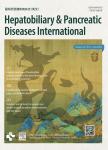Ron receptor-dependent gene regulation of Kupffer cells during endotoxemia
Ron receptor-dependent gene regulation of Kupffer cells during endotoxemia作者机构:Department of Cancer Biology University of Cincinnati Department of Research Cincinnati Veterans Affairs Medical Center
出 版 物:《Hepatobiliary & Pancreatic Diseases International》 (国际肝胆胰疾病杂志(英文版))
年 卷 期:2014年第13卷第3期
页 面:281-292页
核心收录:
学科分类:1002[医学-临床医学] 100201[医学-内科学(含:心血管病、血液病、呼吸系病、消化系病、内分泌与代谢病、肾病、风湿病、传染病)] 10[医学]
基 金:supported in part by grants from the Public Health Services Grants CA125379 NIH P30 DK078392 from the National Institutes of Health,Veteran's Administration VA1001BX000803 12POST12040055 from the American Heart Association Great Rivers Affiliate
主 题:Mst1R Mefv Lcn2 Met receptor Kupffer cells macrophages
摘 要:BACKGROUND: Ron receptor tyrosine kinase signaling in macrophages, including Kupffer cells and alveolar macrophages,suppresses endotoxin-induced proinflammatory cytokine/chemokine production. Further, we have also identified genes from Ron replete and Ron deplete livers that were differentially expressed during the progression of liver inflammation associated with acute liver failure in mice by microarray *** important genes and signaling pathways have been identified downstream of Ron signaling during progression of inflammation by this approach, the precise role that Ron receptor plays in regulating the transcriptional landscape in macrophages, and particular in isolated Kupffer cells, has still not been ***: Kupffer cells were isolated from wild-type(TK+/+)and Ron tyrosine kinase deficient(TK-/-) mice. Ex vivo, the cells were treated with lipopolysaccharide(LPS) in the presence or absence of the Ron ligand, hepatocyte growth factor-like protein(HGFL). Microarray and qRT-PCR analyses were utilized to identify alterations in gene expression between ***: Microarray analyses identified genes expressed differentially in TK+/+ and TK-/- Kupffer cells basally as well as after HGFL and LPS treatment. Interestingly, our studies identified Mefv, a gene that codes for the anti-inflammatory protein pyrin, as an HGFL-stimulated Ron-dependent ***, lipocalin 2, a proinflammatory gene, which is induced by LPS, was significantly suppressed by HGFL *** results were validated by qRT-PCR studies on Kupffer cells treated with LPS and ***: The studies herein suggest a novel mechanism whereby HGFL-induced Ron receptor activation promotes the expression of anti-inflammatory genes while inhibiting genes involved in inflammation with a net effect of diminished inflammation in macrophages.



